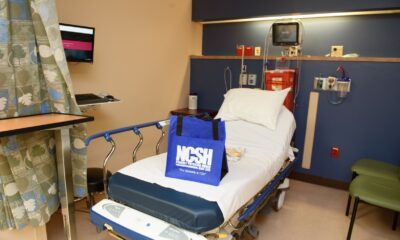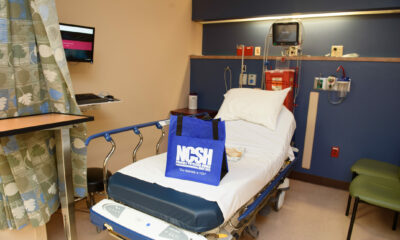Access your own patient portal, provided by NCSH.
General Surgery
Frequently Asked Questions About General Surgery
Wed, Jan 03, 2024

Have you or a loved one been told that you need to undergo general surgery for a medical condition? If so, you may have questions about it. At North Carolina Specialty Hospital, our team of expert general surgeons performs a wide variety of procedures. We’ve included our most commonly asked questions here for the answers you need to feel comfortable and confident about undergoing surgery.
The Top 7 Frequently Asked Questions About General Surgery
 1. What is general surgery?
1. What is general surgery?
General surgery is a medical specialty that focuses on diagnosing and treating conditions and diseases of the body. It involves a wide range of surgical operations and procedures to repair or remove damaged, diseased, or abnormal organs and tissues. It also involves pain management.
2. What are general surgery procedures?
A general surgery procedure is any surgical intervention that involves the abdomen, breasts, skin and soft tissues, endocrine system (thyroid and parathyroid glands), or vascular system (blood vessels).
At North Carolina Specialty Hospital, we handle surgical procedures involving the breasts, endocrine system, gastrointestinal tract, colon, liver, pancreas, and rectum. These procedures include minimally invasive methods such as laparoscopic surgeries when appropriate. Laparoscopic surgery is performed through small incisions utilizing cameras to visualize the inside of the abdomen. The advantages of laparoscopic surgery include less postoperative pain, quicker recovery periods, a lower risk of bleeding, and a lower risk of infection.
These are some of the general surgical specialties performed at NCSH:
- Appendectomy
- Hernia Repair
- Thyroidectomy
- Colon Resection
- Cholecystectomy
- Excision of Cysts, Masses, or Lipomas
- Port Placement
- Muscle Biopsy
- Hemorrhoidectomy
- Breast Biopsy
- Mastectomy (with or without Breast Reconstruction)
- Lumpectomy
- Sentinel Lymph Node Biopsy
As this is just a partial list, please feel free to talk to North Carolina Specialty Hospital about our complete list of general surgery procedures if you don’t see your condition listed here.
3. What is a general surgeon?
General surgeons are specially trained doctors who specialize in diagnosing and treating conditions of the body using surgical operations.
These skilled surgeons must complete a four-year residency program in an accredited hospital before becoming certified and practicing surgery. In addition to completing medical school, general surgeons must also pass the American Board of Surgery’s certification exam. This exam tests the surgeon’s ability to diagnose and treat diseases and conditions of the body.
Additionally, general surgeons are trained to handle emergency situations and provide critical care. They can diagnose and treat trauma, including injuries from motor vehicle accidents or other types of physical trauma. And they often offer follow-up care for cancer patients who have undergone surgery or radiation treatment.
4. What do general surgeons do?
General surgeons perform surgical procedures, from emergency operations to complex reconstructive surgeries. They diagnose and treat a wide range of medical conditions and operate on the abdomen, breasts, skin and soft tissues, endocrine system, and vascular system. As experts in open and minimally invasive techniques, they develop treatment plans and perform preoperative, operative, and postoperative care. They also collaborate with other health care professionals, such as anesthesiologists, nurses, and technologists. Many general surgeons are involved in research and teaching.
5. How can I prepare for general surgery?
Preparation for general surgery will vary depending on the type of procedure being performed. Your surgeon should provide you with detailed instructions to help you prepare for your procedure. You will learn about preoperative testing, which medications need to be stopped prior to the surgery, diet restrictions, and any other instructions specific to your procedure. It is also important to discuss any questions or concerns you have with your surgeon before the procedure.
6. Where can I go for general surgery in North Carolina?
North Carolina Specialty Hospital is a leading surgical provider in the state, offering the latest treatments and technology to our patients. Our expertly trained board-certified general surgeons’ commitment to advancement results in a number of high rankings in both quality measures and patient satisfaction. We strive to maintain a 4:1 patient/nurse ratio to provide you with the utmost standards of patient care and satisfaction.
7. How do I make an appointment?
It’s easy. If you or a loved one needs general surgery, you can schedule an appointment with one of our general surgeons to discuss your options and receive a customized treatment plan. You can also read more about our expert general surgery here.
RELATED NEWS

What Is a Muscle Biopsy? 8 Things to Know
If you have unusual muscle symptoms that cannot be easily explained, you could benefit from a muscle biopsy. This relatively simple procedure helps specialists determine the underlying cause of muscle pain and weakness, rule out…
Continue Reading

Why Can’t You Eat Before Surgery? Find Out the 3 Important Reasons
If you’re having surgery, you probably have questions, such as why can’t you eat or drink before surgery. NCSH has your answer.
Continue Reading

Skin Graft Healing Stages—What You Need to Know
Skin grafting for burns and other challenging wounds is a procedure that uses donor tissue, often from the patient’s own body. If you need a skin graft, your surgeon will explain the surgery, how the…
Continue Reading
Stay Current
Educational Articles & More
View News & Press
 1. What is general surgery?
1. What is general surgery?